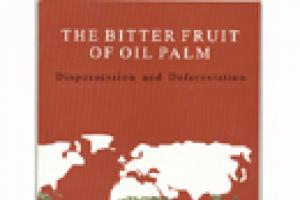What is happening in Espirito Santo --one of the smallest Brazilian states-- is historic. Mighty plantation and pulp company Aracruz Celulose has generated so much opposition stemming from its activities, that the state Parliament recently passed --almost unanimously-- a law banning further planting of eucalyptus until an agro-ecological mapping of the state is put in place, which will define where eucalyptus can and cannot be planted. The law was immediately vetoed --during a "solemn session"-- by the Governor and now Parliament must decide whether to lift or maintain the veto.
Large-Scale Tree Plantations
Industrial tree plantations are large-scale, intensively managed, even-aged monocultures, involving vast areas of fertile land under the control of plantation companies. Management of plantations involves the use of huge amounts of water as well as agrochemicals—which harm humans, and plants and animals in the plantations and surrounding areas.
Bulletin articles
11 August 2001
CDC Capital Partners is a major actor in Papua New Guinea’s oil palm plantations. A former UK foreign aid programme, it later became a public private company and invests in PNG through Pacific Rim Plantations Ltd., holding 76% of its shares.
Pacific Rim Plantations Ltd. owns and manages about 23,000 hectares of oil palm plantations in three locations: Northern Province (Popondetta), Milne Bay Province (Alotau) on PNG’s north coast and at Kavieng on New Ireland island. It operates in joint venture with the PNG government, which has a 20% stake.
Publications
9 August 2001
Given the widely ignored impacts of oil palm plantations and their widespread promotion throughout the tropics, the World Rainforest Movement decided to bring together research and local struggles in a book aimed as a tool for action. Given that the problem is present in Africa, Asia and Latin America, we chose three representative cases for each continent: Cameroon, Ecuador and Indonesia.
Bulletin articles
12 July 2001
The news have reached the entire world: the Kyoto Protocol has been saved! In spite of this information being formally true, it hides the fact that this does not mean that the planet's climate has been saved, which is the real issue at stake. On the contrary, as it now stands, while not solving the problem it was intended to address, the Kyoto Protocol will impose further impacts on local people through the implementation of carbon sink projects.
Bulletin articles
12 July 2001
Environmental and human rights organizations have recently sent an open letter to Danish timber trade corporation Dalhoff Larsen & Horneman A/S (DLH Group), calling it to stop dealing with Liberian logging companies which, besides being responsible for the serious process of deforestation that has been occurring during the last decade in Liberia, have been also found involved --according to a United Nations report-- in a number of illegal activities both in Liberia and in neighbouring Sierra Leone.
Bulletin articles
12 July 2001
For many years, fuelwood use and charcoal production have been blamed for deforestation throughout the South, though this has seldom been the truth. In the case of Senegal it is clearly false. Charcoal is a major energy source in this country, where its capital city Dakar consumes 90 per cent of all the charcoal produced from the forest. However, forests are not even close to exhaustion, and regeneration after woodcutting is reported to be quite robust.
Bulletin articles
12 July 2001
Commercial-scale logging has a large number of impacts on local communities, among which the loss of sources of livelihood. One of such cases is the cutting of trees used by local people for collecting liquid resin.
Bulletin articles
12 July 2001
In July 2001, Thailand’s chief logging agency, the state-owned Forestry Industry Organisation (FIO), received “sustainable management” certification of two teak plantations. Undertaken by SmartWood, a forest management certification organisation that is accredited by the Forest Stewardship Council (FSC), the certification would help solve the agency’s financial troubles as well as cover up its infamous past.
Bulletin articles
12 July 2001
It is well-known that the pulp and paper industry in Indonesia – and in the world – is environmentally and socially destructive. One of the most important companies in pulp and paper production is the Asia Pulp & Paper Company, ranking tenth in the world. One of its branches is Indah Kiat Pulp & Paper, which has a pulp and paper mill located in Perawang to the south of Sumatra.
Bulletin articles
12 July 2001
No one can doubt that the world is becoming increasingly mad. The Uruguayan forestry plan was prepared by the Japanese, the Thai plan by Finns and now, the “Strategic Forestry Plan for Mexico 2025” will also be prepared by Finns.
Bulletin articles
12 July 2001
Large-scale eucalyptus plantations in the State of Espirito Santo --and their related pulp production activities-- have generated opposition since the very beginning. They were first opposed by the people more directly affected by them: the Tupinikim and Guaraní indigenous peoples, Afrobrazilian communities (quilombos) and local farmers, whose lands were appropriated to give way to the plantations.
Bulletin articles
12 July 2001
Eucalyptus Pacifico S.A. - EUCAPACIFIC is a new company set up at the end of 2000 to carry out a major eucalyptus plantation project on the Ecuadorian coast, in the Province of Esmeraldas, specifically in the Tonchigüe and Sua sector. This company, composed of transnational capital, has received approval by the Ministry of the Environment to carry out large scale plantations.

